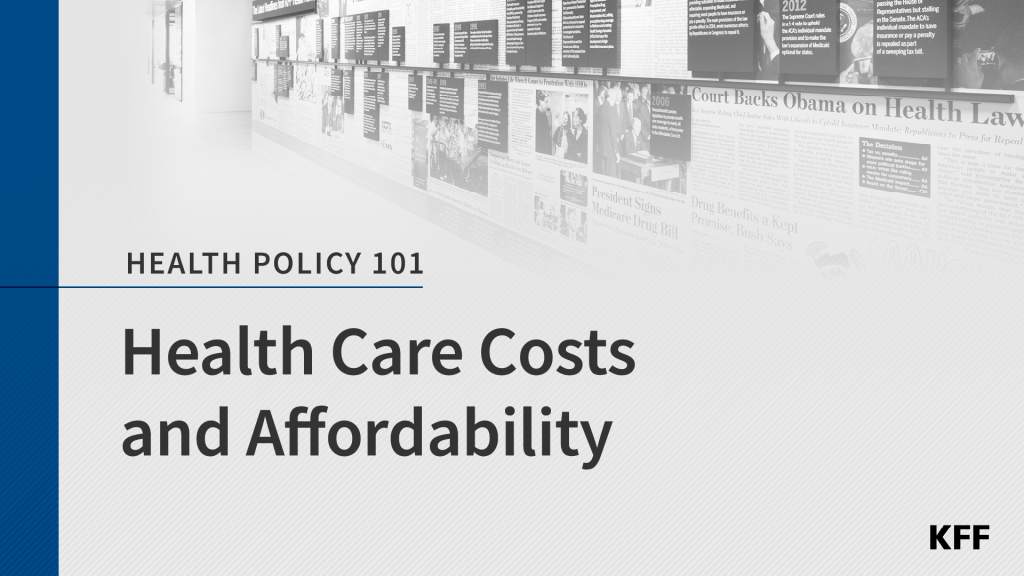Costs and Outcomes of Mental Health and Substance Use Disorders in the U.S.
This slideshow looks at costs and outcomes of mental health and substance use disorders in the United States.
The independent source for health policy research, polling, and news.
KFF’s policy research provides facts and analysis on a wide range of policy issues and public programs.
KFF designs, conducts and analyzes original public opinion and survey research on Americans’ attitudes, knowledge, and experiences with the health care system to help amplify the public’s voice in major national debates.
KFF Health News is a national newsroom that produces in-depth journalism about health issues and is one of the organization’s core operating programs.
Health Policy 101 is a comprehensive guide covering fundamental aspects of U.S. health policy and programs, including Medicare, Medicaid, the Affordable Care Act, employer-sponsored insurance, the uninsured population, health care costs and affordability, women's health issues, and health care politics. The Health Care Costs and Affordability chapter explores trends in health care costs in the U.S. and the factors that contribute to this spending. It also examines how health care spending varies across the population, the impact of costs on care affordability and individuals' overall financial vulnerability.
This slideshow looks at costs and outcomes of mental health and substance use disorders in the United States.
In an Axios column, Drew Altman raises a health care issue that isn’t being debated, a large share of the public don’t have the assets to cover the cost sharing in their health plan if they get sick.
The American Health Care Act (AHCA), which has passed the House of Representatives, contains a controversial provision that would allow states to waive community rating in the individual insurance market. In this brief we estimate the number of people with pre-existing conditions who might be affected by such a policy.
This brief explains the key AHCA provisions that would reshape the private market to more closely resemble the pre-Affordable Care Act period, and the effects of these changes on adults ages 50-64. The brief also discusses how changes to Medicaid could affect older, low-income adults, and how an increase in the number of uninsured older adults could have implications for the Medicare program in the future.
This brief describes the different forms of tax assistance for private health insurance, including subsidies offered through the Affordable Care Act's marketplaces and benefits for people who are self-employed or who have employer-based coverage. The brief also provides examples of how the subsidies work and how the amounts may differ by income and type of coverage.
The Children’s Health Insurance Program (CHIP) was established in 1997 to provide coverage for uninsured children who are low-income but above the threshold for Medicaid eligibility. In 2009, and again in the Affordable Care Act (ACA), Congress extended federal funding for CHIP, but funding will expire a little over a year from now. Decisions about CHIP’s future funding will be consequential as more than 8 million low-income children were covered by CHIP at some point during 2012. To help inform the policy debate about CHIP, this brief reviews key data and evidence from the large body of research on the impact of children’s coverage.
A look at public opinion about the ACA and its provisions, including protections for people with pre-existing conditions and the impact of the law on families.
Under the Patient Protection and Affordable Care Act (PPACA), insurance plans offered through state insurance exchanges as well as non-grandfathered plans offered in the individual and small group markets - will be required to cover a set of health benefits and services called the "essential health benefits" package.
Costs are a Barrier to Care and Treatment for Many Women Download Source Kaiser Health Tracking Poll: (May 2012…
This survey by the Kaiser Family Foundation and California Health Care Foundation gauges California residents’ views on health care priorities facing the state’s new governor and legislature, including health care affordability, access to care, mental health and substance use treatment, and provider shortages. It also highlights Californians’ experiences in the health care system, as well as views on the Affordable Care Act, Covered California, Medi-Cal, and proposals to advance a single-payer health insurance system in the state.
© 2026 KFF
